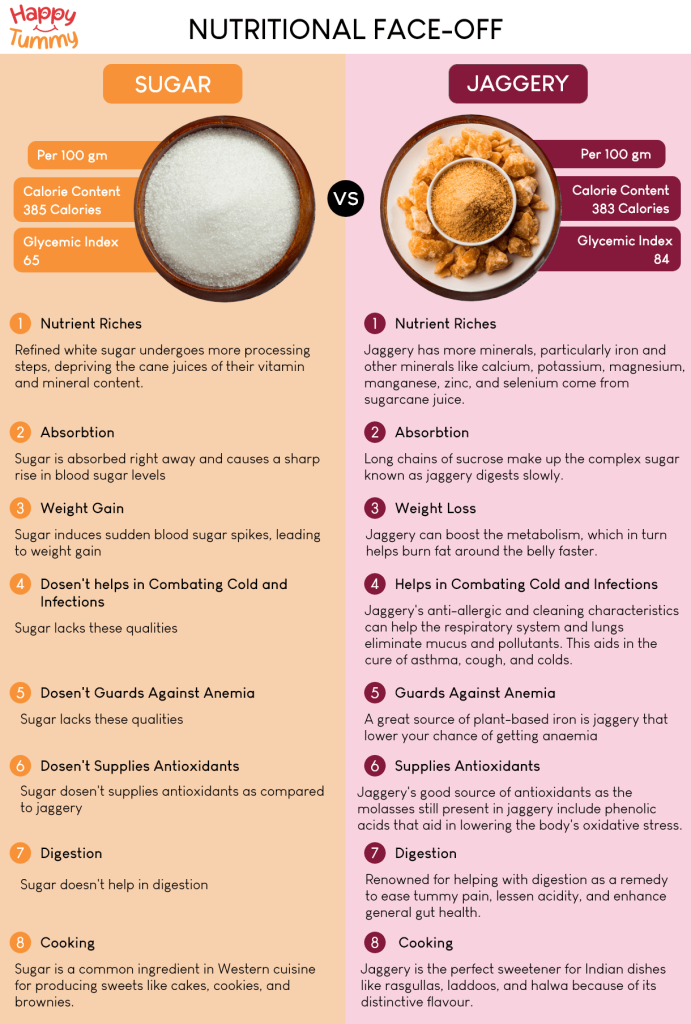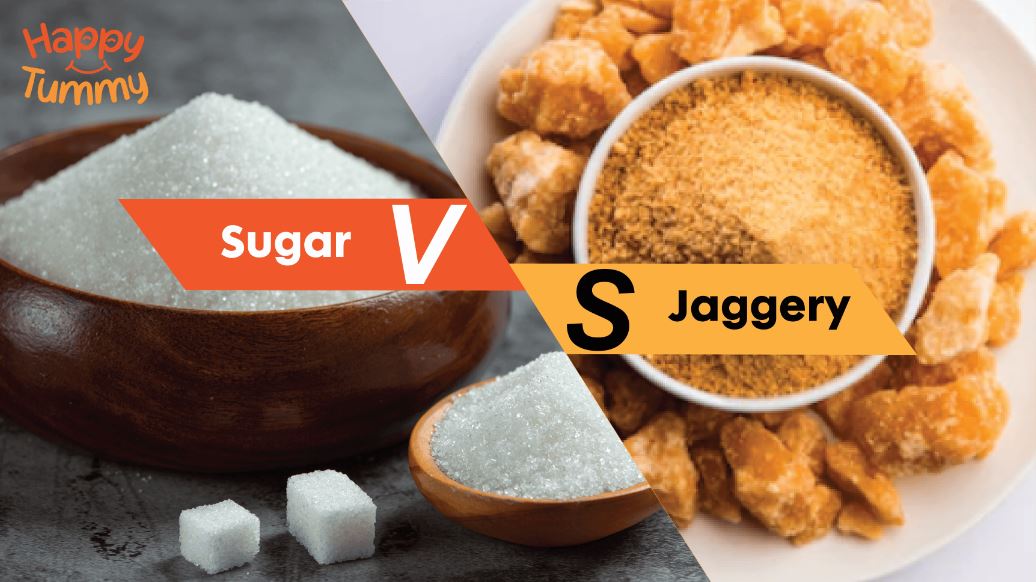Table of Contents
Sweeteners are a crucial component of our diets, whether used in morning tea, coffee, or dessert after meals. We often come across people boldly asking for “black tea with a teaspoon of jaggery, please,” relishing the gratification of making what they thought to be a healthy decision. Two frequently used sweeteners, sugar and jaggery, have different qualities and advantages.
The fact is that, despite their apparent differences, jaggery and sugar may not differ as significantly as you first believed. So, in a world where health has taken center stage, which sweetener should you choose: jaggery or sugar?
Jaggery is regarded as a superfood since it has lower sucrose content than white sugar and more vitamins and minerals. Many individuals have switched from sugar to healthier sweeteners like jaggery to keep active and eat well.
Does that imply that consuming jaggery is a specific strategy to cut calories and prevent insulin spikes? Actually, no. Both sugar and jaggery have a comparable caloric profile. Despite having distinct processing methods, they are both derived from sugarcane juice. Read on to understand which sweetener is better than the other.
Sugar vs. Jaggery

Let’s cover some fundamentals to start our topic on jaggery vs. sugar. Quick thoughts that will help us respond to this query:
Calorie Content: Jaggery is more nutritious than sugar, but because it contains a lot of calories, it should only be used sparingly. Sorry to burst your bubble, but jaggery and white sugar have almost the same calorie density. 383 and 385 calories per 100 grammes. If you change it to “per teaspoon,” the difference almost disappears.
Glycemic Index [GI]: It indicates how gradually or abruptly food raises blood glucose levels in your body. Foods with low GI values release glucose consistently and slowly, whereas those with high GI values release glucose quickly.
Clearly, jaggery has a high GI compared to sugar. Because jaggery has a high glycemic index and might induce a fast jump in blood sugar levels, it is advised that people with diabetes avoid eating it.
| Per 100 gm | Calorie Content | Glycemic Index |
| Sugar | 385 Calories | 65 |
| Jaggery | 383 Calories | 84 |
Thus, comparing jaggery and sugar in terms of calories and GI, both are almost the same, and there is not much difference.
Then, Why is Jaggery Considered Better?
Both are made from sugarcane, but they go through several processing steps. Jaggery preserves its nutritious value throughout processing, whereas sugar completely loses it.
While jaggery is created by heating sugarcane juice syrup for several hours and then moulding it into a complex shape, sugar is formed by condensing and crystallizing sugarcane juice syrup. Jaggery provides advantages for your health because it is unprocessed. That’s all.
Let’s start simply by understanding the advantages of jaggery use that sugar does not offer.
1. Jaggery Holds Nutrient Riches
Unrefined sugar made from concentrated sugarcane juice is known as jaggery – also known as Gur in Hindi language. Unlike the preparation of sugar, jaggery does not need the separation of the molasses. Jaggery, thus, has more minerals, particularly iron. While most of the iron in jaggery comes through its preparation in iron vessels, other minerals like calcium, potassium, magnesium, manganese, zinc, and selenium come from sugarcane juice.
Here is a summary of what it contains per 100gm [1]:
| Nutrient | Per 100 grams |
| Protein | 4 grams. |
| Fat | 1 grams. |
| Iron | 11 mg, or 61% of the RDI. |
| Magnesium | 100–150mg, or about 30% of the RDI |
| Potassium | 1050 mg, or 30% of the RDI. |
| Manganese | 2–0.5 mg, or 10–20% of the RDI. |
On the other hand, refined white sugar undergoes more processing steps, depriving the cane juices of their vitamin and mineral content.
2. Jaggery Aids in Healthy Digestion
Jaggery is renowned for helping with digestion. It is used by many individuals in various regions of India in tiny amounts after meals as a remedy to ease tummy pain, lessen acidity, and enhance general gut health. This sweet switch to gur may aid in the body’s ability to cleanse the intestines and stimulate the digestive enzymes [2].
You must try the Aashirvaad Digestive Quotient Test to understand your body’s digestive health. The Digestive Quotient test, created by Aashirvaad Atta with Multigrains and a team of professional nutritionists, determines your digestion score on a scale of 100. Take this two-minute test to assess your Digestive Quotient, and then use the results to plan your meals appropriately and evaluate your progress toward a Happy Tummy.
3. Jaggery Guards Against Anemia
The development of healthy blood and muscle cells depends on iron. Lack of iron in the diet can lead to iron deficiency, anaemia, impairing concentration, and induce weariness and muscular weakness.
A great source of plant-based iron is jaggery. While substituting refined sugar with gur would increase the amount of iron in your diet and lower your chance of getting anaemia, one serving of jaggery won’t satisfy your daily iron requirements.
4. Jaggery Supplies Antioxidants
Jaggery is a good source of antioxidants when compared to sugar. The molasses still present in jaggery include phenolic acids that aid in lowering the body’s oxidative stress. In general, antioxidants are associated with a lower chance of developing several illnesses, fewer aging-related symptoms, and a decreased risk of dementia and macular degeneration. So switching to jaggery from white or brown sugar may help lower your chance of getting these diseases.
5. Gur Absorbs Gradually
Long chains of sucrose make up the complex sugar known as jaggery. As a result, unlike sugar, which is absorbed right away and causes a sharp rise in blood sugar levels, it is digested slowly [3].
6. Gur Averts Weight Gain
Jaggery can boost the metabolism, which in turn helps burn fat around the belly faster. Whereas sugar induces sudden blood sugar spikes, leading to weight gain [4].
7. Aids in Combating Cold and Infections
Jaggery’s anti-allergic and cleaning characteristics can help the respiratory system and lungs eliminate mucus and pollutants. This aids in the cure of asthma, cough, and colds. But sugar lacks these qualities [5].
Jaggery and Sugar in Cooking
When cooking, it’s crucial to select a sweetener that enhances the flavour of the food. Jaggery is the perfect sweetener for Indian dishes like rasgullas, laddoos, and halwa because of its distinctive flavour. This sweetener’s earthy and rich essence gives the recipes a unique flavour and taste.
Conversely, sugar is a common ingredient in Western cuisine for producing sweets like cakes, cookies, and brownies. It is the ideal component for baking since it dissolves rapidly and combines with other ingredients without difficulty. You must use the right amount of sugar; otherwise, the dish’s texture and flavour might be ruined
The Verdict
Here’s a quick rundown. Can jaggery be substituted for sugar? Yes, but keep in mind that it has a more robust flavour and a different texture, so adjust accordingly. Which is better for weight loss? Both have the same number of calories, but jaggery is believed to have more nutrients, making it a healthier choice. If you are simply replacing refined white sugar in your diet and not looking to lower your overall sugar intake, then jaggery is a good alternative. Switch to jaggery, which has fewer chemicals, more nutrients, and maybe some magic, which many cultures believe exists. So jaggery is a good deal.
Frequently Asked Questions
Because jaggery contains a lot of sugar, it can cause blood sugar levels to jump. Additionally, jaggery has a high glycemic index of 84.4, making it inappropriate for people with diabetes to eat.
Sugarcane juice is used to make both molasses and gur. Molasses is the residue that remains after sugar is extracted from sugar cane juice to create sugar. In contrast, manufacturing jaggery entails condensing the entire sugarcane juice.
Ten grams of jaggery should be plenty for everyday usage. Without question, it is a healthier and more nutritious version of sugar, but sugar, nevertheless.
Jaggery is a better alternative to white sugar and healthier than “brown sugar.” White sugar plus molasses equals brown sugar. A by-product of the manufacturing of sugar is molasses. Therefore, the brown sugar you’ve been getting from factories instead of ‘processed’ white sugar is usually just the same white sugar that has undergone an additional processing step.















